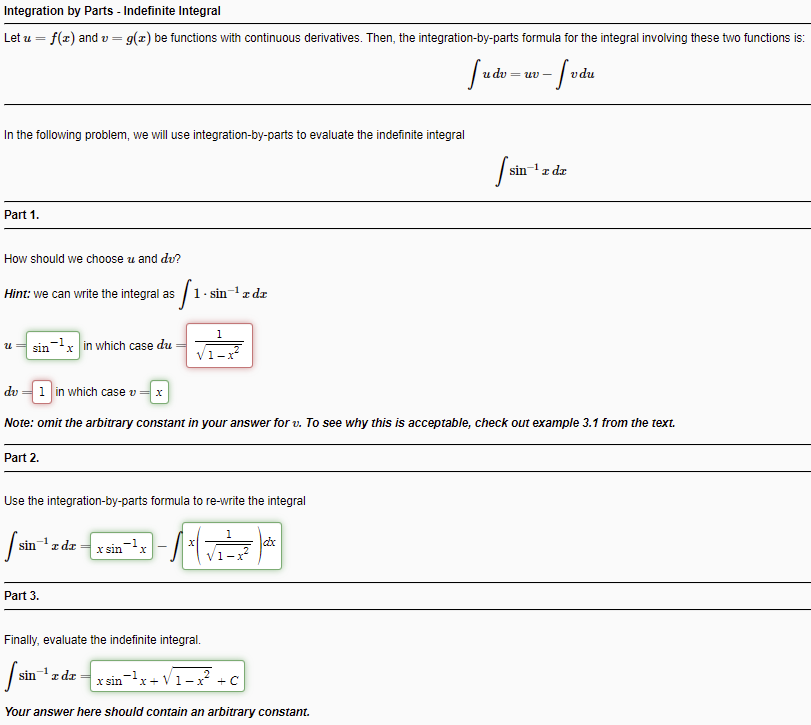Calculus: Early Transcendentals
8th Edition
ISBN:9781285741550
Author:James Stewart
Publisher:James Stewart
Chapter1: Functions And Models
Section: Chapter Questions
Problem 1RCC: (a) What is a function? What are its domain and range? (b) What is the graph of a function? (c) How...
Related questions
Question
Where did I go wrong in the highlighted red box? What is the correct solution

Transcribed Image Text:Integration by Parts - Indefinite Integral
Let u = f(x) and v = g(x) be functions with continuous derivatives. Then, the integration-by-parts formula for the integral involving these two functions is:
%3!
= uv -
In the following problem, we will use integration-by-parts to evaluate the indefinite integral
sin-1z de
Part 1.
How should we choose u and du?
Hint: we can write the integral as /
1. sin-z dz
1
sin-x in which case du
1-x
dv = 1 in which case v = x
Note: omit the arbitrary constant in your answer for v. To see why this is acceptable, check out example 3.1 from the text.
Part 2.
Use the integration-by-parts formula to re-write the integral
1
sin
z dz
x sin-x
V1-x
Part 3.
Finally, evaluate the indefinite integral.
sinz dr
x sin
x+ V1-x + C
Your answer here should contain an arbitrary constant.
Expert Solution
This question has been solved!
Explore an expertly crafted, step-by-step solution for a thorough understanding of key concepts.
Step by step
Solved in 2 steps with 2 images

Recommended textbooks for you

Calculus: Early Transcendentals
Calculus
ISBN:
9781285741550
Author:
James Stewart
Publisher:
Cengage Learning

Thomas' Calculus (14th Edition)
Calculus
ISBN:
9780134438986
Author:
Joel R. Hass, Christopher E. Heil, Maurice D. Weir
Publisher:
PEARSON

Calculus: Early Transcendentals (3rd Edition)
Calculus
ISBN:
9780134763644
Author:
William L. Briggs, Lyle Cochran, Bernard Gillett, Eric Schulz
Publisher:
PEARSON

Calculus: Early Transcendentals
Calculus
ISBN:
9781285741550
Author:
James Stewart
Publisher:
Cengage Learning

Thomas' Calculus (14th Edition)
Calculus
ISBN:
9780134438986
Author:
Joel R. Hass, Christopher E. Heil, Maurice D. Weir
Publisher:
PEARSON

Calculus: Early Transcendentals (3rd Edition)
Calculus
ISBN:
9780134763644
Author:
William L. Briggs, Lyle Cochran, Bernard Gillett, Eric Schulz
Publisher:
PEARSON

Calculus: Early Transcendentals
Calculus
ISBN:
9781319050740
Author:
Jon Rogawski, Colin Adams, Robert Franzosa
Publisher:
W. H. Freeman


Calculus: Early Transcendental Functions
Calculus
ISBN:
9781337552516
Author:
Ron Larson, Bruce H. Edwards
Publisher:
Cengage Learning